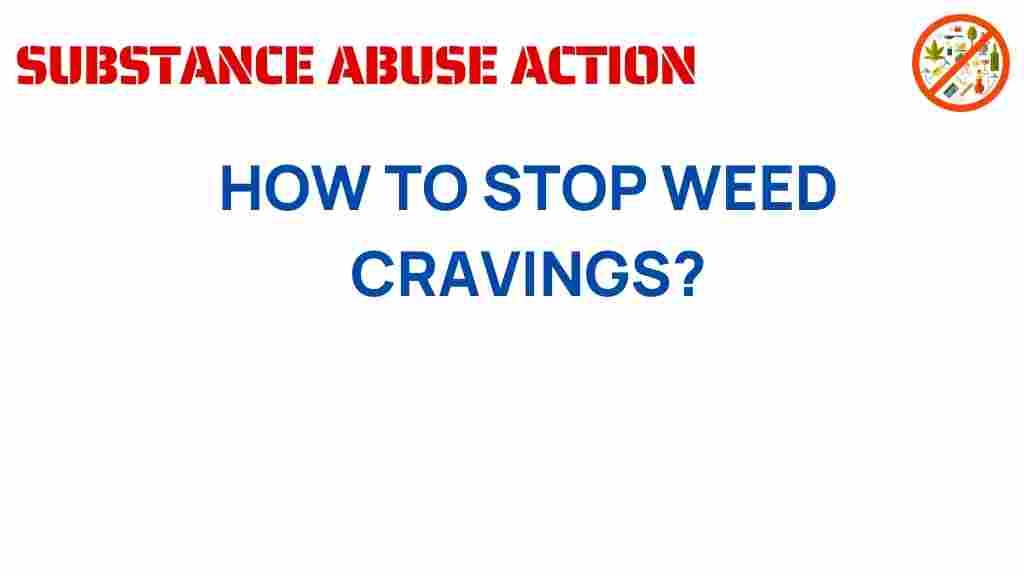Conquering Weed Cravings: Strategies for Lasting Change
For many individuals, the journey towards overcoming addiction can be a daunting challenge, especially when it comes to weed cravings. Whether you are navigating the complexities of cannabis withdrawal or seeking effective coping strategies, understanding how to manage these cravings is crucial for achieving lasting change. This article will explore various self-help techniques, behavioral therapy options, and the importance of support systems in your addiction recovery journey.
Understanding Weed Cravings
Weed cravings are intense feelings or urges that can arise when an individual is attempting to reduce or quit cannabis use. These cravings can be both psychological and physiological, making them a central hurdle in the path to overcoming addiction. Recognizing the triggers and symptoms associated with weed cravings is the first step towards managing them effectively.
- Triggers: Situations, environments, or emotions that lead to the desire to use cannabis.
- Symptoms: Physical sensations such as restlessness, irritability, and anxiety.
Coping Strategies for Managing Weed Cravings
When faced with weed cravings, it is essential to have a toolkit of coping strategies to employ. Here are several effective methods to help you navigate your recovery:
1. Mindfulness and Meditation
Practicing mindfulness can significantly reduce the intensity of cravings. Techniques such as meditation and deep breathing can help you stay present and focused.
- Deep Breathing: Inhale deeply through your nose, hold for a few seconds, and exhale slowly through your mouth.
- Body Scan Meditation: Focus on each part of your body, noticing any tension and consciously relaxing those areas.
2. Physical Activity
Engaging in regular physical exercise can help improve your mood and reduce cravings. Activities like jogging, yoga, or even a short walk can make a significant difference.
3. Healthy Diet
Maintaining a balanced diet is crucial during addiction recovery. Eating nutritious foods can stabilize your mood and energy levels, making it easier to cope with cravings.
4. Journaling
Writing down your thoughts and feelings can provide clarity and help identify patterns in your cravings. Reflecting on your journey can also bolster your motivation to stay committed to recovery.
The Role of Behavioral Therapy
Behavioral therapy is an effective treatment option for managing weed cravings and addressing the underlying issues contributing to addiction. Here are some common therapeutic approaches:
- Cognitive Behavioral Therapy (CBT): CBT helps individuals identify negative thought patterns and replace them with healthier behaviors.
- Motivational Interviewing: This approach encourages individuals to explore their motivations for change and strengthen their commitment to recovery.
- Contingency Management: This method uses positive reinforcement to encourage sobriety and reward progress.
Building a Support System
The importance of a strong support system cannot be overstated in the context of addiction recovery. Surrounding yourself with individuals who understand your journey can provide the encouragement and accountability needed to overcome challenges.
- Support Groups: Consider joining a local or online support group where you can share experiences and strategies with others facing similar challenges.
- Therapists and Counselors: Professional guidance can help you navigate your recovery process more effectively.
- Friends and Family: Engage your loved ones in your recovery journey by sharing your goals and seeking their support.
Self-Help Techniques for Overcoming Addiction
In addition to professional therapy and support systems, there are numerous self-help techniques you can implement to aid in managing weed cravings:
1. Set Clear Goals
Define your objectives regarding cannabis use. Whether you aim to quit completely or reduce your consumption, having clear goals can guide your actions.
2. Develop a Routine
Establishing a daily routine can provide structure and help minimize the chances of encountering triggers that lead to cravings.
3. Avoid High-Risk Situations
Identify and steer clear of environments or social settings that may trigger your cravings. This proactive approach can significantly reduce relapse risk.
4. Find Alternative Activities
Engage in hobbies or activities that bring you joy and fulfillment. Filling your time with positive experiences can help distract from cravings.
Troubleshooting Common Challenges
Even with the best strategies in place, challenges will arise. Here are some common issues and solutions that may help:
1. High Stress Levels
Many individuals turn to cannabis as a coping mechanism for stress. Finding healthier ways to manage stress can help mitigate cravings.
- Practice Relaxation Techniques: Explore methods like yoga, tai chi, or guided imagery.
- Engage in Social Activities: Spend time with friends or family to alleviate stress through social support.
2. Withdrawal Symptoms
Cannabis withdrawal can include symptoms such as irritability and sleep disturbances. Knowing what to expect can help you prepare.
- Stay Hydrated: Drink plenty of water to help alleviate discomfort.
- Seek Professional Help: If symptoms become overwhelming, consult a healthcare professional for support.
3. Relapse
Relapsing during recovery is common. It does not signify failure but rather an opportunity to learn and strengthen your resolve.
- Reflect on the Experience: Analyze the circumstances that led to the relapse and adjust your strategies accordingly.
- Reach Out for Support: Don’t hesitate to contact your support system for guidance and encouragement.
Conclusion
Conquering weed cravings is a multifaceted process that requires understanding, commitment, and the right tools. By implementing effective coping strategies, utilizing behavioral therapy, and building a supportive network, you can navigate the challenges of addiction recovery with greater confidence. Remember, every journey is unique, and finding what works best for you is essential. If you’re looking for more resources on managing addiction, consider visiting this helpful site.
Ultimately, the path to overcoming addiction is a personal one, but with determination and the right strategies, lasting change is within your reach. Stay focused on your goals, and celebrate every step you take towards a healthier, addiction-free life.
This article is in the category Recovery and created by SubstanceAbuseAction Team
